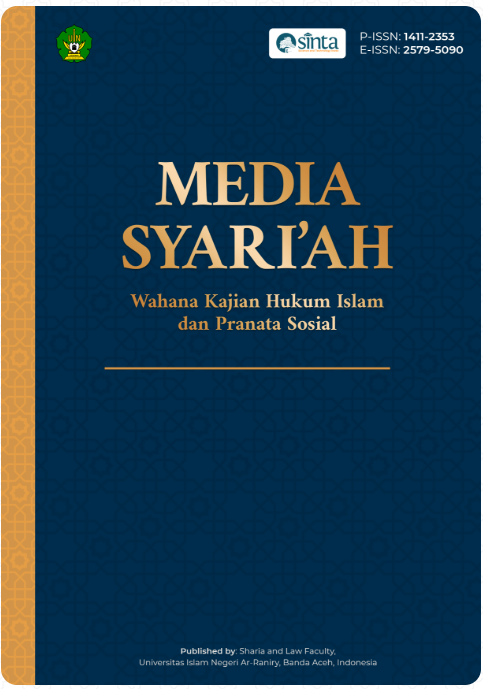Children's Legal Status in Kediri Religious Court Marriage Dispensation Cases
DOI:
https://doi.org/10.22373/jms.v26i1.22397Keywords:
Children, Law, Marriage Dispensation, Religious CourtsAbstract
Marriage is permitted for those who have fulfilled the marriage requirements as regulated in statutory regulations. Among them, the minimum age for marriage for prospective male and female brides is the same, 19 years. For those who do not meet the minimum age requirements, marriage can still take place after receiving a marriage dispensation from the court. Data shows that there are a lot of requests for marriage dispensation in Indonesia, in fact every year there is a significant increase. The Kediri City Religious Court only has 3 sub-districts, in 2022, 69 marriage dispensation cases will be accepted. The reason that is often given is that the relationship between the prospective bridegroom and the female is very close, parents/guardians are afraid and worried that they will increasingly fall into actions that are contrary to morals or religion, and quite a few of the prospective wives are already pregnant. In adjudicating cases regarding requests for marriage dispensation, the court often considers two disadvantages, which occur as a result of early marriage and if the marriage dispensation is rejected. Interesting, knowing the practice and position of children in conflict with the law in cases of requests for marriage dispensation at the Kediri City Religious Court. The practice of marriage dispensation application cases is in accordance with general civil procedural law and statutory regulations, especially Law Number 16 of 2019, Law Number 23 of 2002, and Supreme Court Regulation Number 5 of 2019. The examination is in accordance with the principles -the principle of children dealing with the law, because every case involving children is required to consider the best interests of the child so that the determination must take an approach to the best interests of the child, which is carried out comprehensively.References
Easter, V., & Hadiati, M. (2022). Implementasi Dispensasi Perkawinan Pasca Dikeluarkan Revisi Undang-Undang Perkawinan. Jurnal Hukum Adigama, 5(1), 1735–1751.
Hadaiyatullah, S. S., & Huda, N. (2020). Praktek Hukum Acara Dispensasi Kawin. ASAS: Jurnal Hukum Ekonomi Syariah, 12(01), 150–166.
Hidayatulloh, H., & Janah, M. (2020). Dispensasi nikah di bawah umur dalam hukum Islam. Jurnal Hukum Keluarga Islam, 5(1), 34–61.
Marzuki, M. (2017). Penelitian Hukum: Edisi Revisi. Prenada Media.
Putusan Perkara No. 286/Pdt.G/2022/PA.Kdr, (2022).
Putusan Perkara No. 402/Pdt.G/2021/PA.Kdr, (2021).
Putusan Perkara No. 517/Pdt.G/2022/PA.Kdr, (2022).
Putusan Perkara No. 618/Pdt.G/2020/PA.Kdr, (2020).
Putusan Perkara No. 635/Pdrt.G/2020/PA.Kdr, (2020).
Rachmatulloh, M. A., & Syafiuddin, C. (2022). Praktik Permohonan Dispensasi Kawin di Pengadilan (Studi Peraturan Mahkamah Agung Nomor 5 Tahun 2019). Jurnal Al-Qadau: Peradilan Dan Hukum Keluarga Islam, 9(1), 1–15.
Satria, R. (2019). Pedoman Penanganan Perkara Dispensasi Kawin Pasca Revisi Undang- Undang Perkawinan. Dalam Https://Badilag. Mahkamahagung. Go. Id/Artikel/Publikasi/Artikel/Pedom an-Penanganan-Perkara-Dispensasi-Kawin-Pasca-Revisi-Undangundang-Perkawinan-Oleh-Rio-Satria-16-12.
Shidarta, S. (2022). Putusan Pengadilan sebagai Objek Penulisan Artikel Ilmiah. Undang: Jurnal Hukum, 5(1), 105–142.
Sovia, S. N., Hasbullah, A. R., Mustakim, A. A., Setiawan, M. A. R., Rais, P., & Rizal, M. C. (2022). Ragam Metode Penelitian Hukum. Kediri: Lembaga Studi Hukum Pidana, Excellent.
Downloads
Published
Issue
Section
License
MEDIA SYARI'AH: Wahana Kajian Hukum Islam dan Pranata Sosial has CC-BY-SA or an equivalent license as the optimal license for the publication, distribution, use, and reuse of scholarly work. Authors who publish with this journal agree to the following terms:
1. Authors retain copyright and grant the journal right of first publication with the work simultaneously licensed under a Creative Commons Attribution-ShareAlike 4.0 International License that allows others to share the work with an acknowledgment of the work's authorship and initial publication in this journal.
2. Authors are able to enter into separate, additional contractual arrangements for the non-exclusive distribution of the journal's published version of the work (e.g., post it to an institutional repository or publish it in a book), with an acknowledgment of its initial publication in this journal.
3. Authors are permitted and encouraged to post their work online (e.g., in institutional repositories or on their website) prior to and during the submission process, as it can lead to productive exchanges, as well as earlier and greater citation of published work (See The Effect of Open Access).
You are free to:
Share — copy and redistribute the material in any medium or format.
Adapt — remix, transform, and build upon the material for any purpose, even commercially.
The licensor cannot revoke these freedoms as long as you follow the license terms.
All papers published in MEDIA SYARI'AH: Wahana Kajian Hukum Islam dan Pranata Sosial are licensed under a Creative Commons Attribution-ShareAlike 4.0 International License.




.png)


.png)
.png)
.png)



